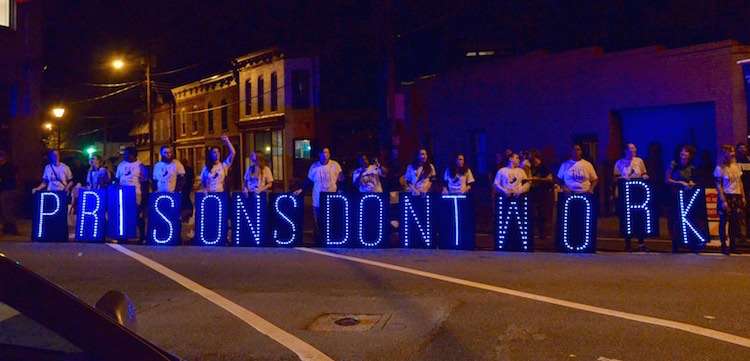University to Build Support Center With Jobs for Adults With Autism
Adults with autism are left with few options when they age out of "the system." Fortunately, one college plans to offer a great work-life opportunity.

Painters, writers, DJs, and musicians worked as volunteers at the local juvenile detention center in an 8-week program that teaches the youth there is more to their lives than the labels that come with their convictions as law-breakers.
MORE: Behind Bars Barista Training a Boost For Women's Prison Inmates
"It's inspiring – the moment when they realize that they have the capacity to make change within their own lives," the program director of Performing Statistics, Taekia Glass, told Good News Network. "even if it's as simple as writing something down on paper about how they feel. It doesn't have to be an overtly grand gesture…They can do it one-by-one just by voicing their opinion and by having advocates in the community working with them to be able to get their voices out there."
Advocates they already have.
Over the weekend, the streets of Richmond, Virginia were flooded by local citizens bearing ‘Prisons Don't Work' tee-shirts to rally lawmakers to change how youth are treated in the juvenile justice system.
Hundreds of Richmond locals, paraded down Broad Street chanting 'No incarceration, we need an education!' and ‘Stop arresting us, you should invest in us!' The rally gathered momentum until it reached the Art 180 gallery where poetry, sculptures, and projects created by the incarcerated youth were on display.
Armed with petitions, Performing Statistics partnered with the Legal Aid Justice Center and Rise For Youth to advocate for change in the state's juvenile justice policy.
Richmond, the state capital, has one of the highest incarceration rates of any locality in Virginia; thousands of kids are marched through a prison system that focuses on punishment, rather than treatment and rehabilitation.
MORE: Prison Program Produces Business Savvy Inmates And Huge Success Rates
With 10,000 children locked away each year, and half of them under age 14, the taxpayers end up paying thousands of dollars for years of punishment instead of community-driven rehabilitation alternatives.
The creativity sparked by the Performing Statistics workshops has not only shaken free the stigmatizing labels on incarcerated youth, but also provided evidence of their attitude improvement.
"I used rapping as a therapeutic tool when I was in and out of prison and institutions," says one project leader, hip hop teacher Gina Lyles. "I tell them to put their feelings on paper. You can write poetry, you can write stories, you can write words. You think people aren't listening but folks want to hear your story. We need your words."
Gina, who rotated through prison for 24 years starting at age fourteen, explained how her experience in the system influenced her passion for the program.
"After having a daughter at 19, I was under stress to find and keep a job, when I came from a background of not having a lot. It was a lot on me so I ended up right back in the [prison] system," she said. "I tell people prisons don't work because not only did I go to prison for eight years, I'm now a felon, but I'm not a violent person. I'm a loving person and I would never hurt anybody. Once you incarcerate a child, you put in their minds that they're a bad kid, they're a criminal, and they won't amount to anything. That was a self-esteem killer for me."
To help make a real difference, the creative volunteers worked with the youth offenders to create a training manual emphasizing anti-violent approaches to law enforcement, which, according to the Performing Statistics website, have been used to instruct new police cadets in Richmond.
Leaders have also opened up numerous conversations with lawmakers about policy changes including reduced sentencing, closing costly juvenile detention facilities, and ending zero tolerance in Virginia school districts.
"I want people to know that our kids are amazing no matter what circumstances they're in, no matter what crime they committed, or what the case may be," says Taekia. "There is definitely potential in all of them to be great and it's up to us and the community to realize that it really does take a village."
Be the first to comment